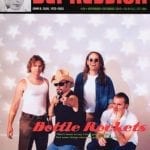Hello Stranger from Issue #48
“I am deeply saddened by the loss of my children’s grandfather and my very dear friend. I loved big John with all my heart. The citizens of the world have lost one of their most enduring guiding lights. As a musical hero to millions, a trailblazing artist, humanitarian, spiritual leader, social commentator and most importantly, patriarch to one of the most varied and colorful extended families imaginable, Johnny Cash will, like Will Rogers, stand forever as a symbol of intelligence, creativity, compassion and common sense. I’m thinking Mt. Rushmore.”
— Rodney Crowell
You have Rodney to thank for planting the seed that bloomed into this issue’s Screen Door. Crowell’s assessment of Johnny Cash’s deserved stature — along with a similar observation from the Mavericks’ Raul Malo when Cash turned 70 last year, and our Canadian correspondent Paul Cantin’s comment that his one chance to meet Cash in 1994 “felt like shaking hands with Mt. Rushmore” — set off the proverbial light bulb in Grant’s head. We think you’ll appreciate the outcome (which was realized through the work of Nate Clesowich).
Just two issues ago, Crowell’s extended ruminations about June Carter Cash appeared in our Farther Along section. Some are not surprised to see Johnny following so quickly, for though we would have treasured every day he remained within our midst, he stated plainly that June was the love of his life. There’s no doubt that, as much as we will miss them both, for the past four months, they missed each other more.
Historian Rich Kienzle offers his perspective on Cash’s legacy in this issue’s Farther Along section. Elsewhere, you’ll find Johnny looming in the thoughts and comments of various artists throughout the issue, from feature articles on Merle Haggard and the Bottle Rockets and Josh Ritter to a live review of the Austin City Limits Festival to a reissue review of Louisiana Hayride recordings by Johnny and June. All a matter of happenstance rather than intention, really — but that speaks to the pervasive impact of his passing.
And, for the second year in a row, a picture of Johnny Cash appears on the cover of our November-December issue. It’s the first time we’ve ever obscured any part of our logo on the cover; we trust you will agree with the sentiment that the placement creates. No single artist meant more to alternative country than Johnny Cash. Whoever he was.
(Countless folks offered their words to the world about Cash in the days that followed his death. We’d like to pass along this recollection sent along by Michael Eck, a writer in Albany, New York.)
In November 1989, as a young reporter stringing for a local daily, I was asked to interview Johnny Cash for a piece on an upcoming concert in our area. I jumped at the chance, of course, because Cash had long been a hero of mine. Despite my best journalistic reserve, I nearly melted when that profound voice came on the line.
Eventually, I asked if he still sang one of my personal favorites, “Any Old Wind That Blows”, a Dick Feller tune that was the title track to an underappreciated 1973 album. Cash seemed charmed that I asked, but said that, no, he didn’t do it anymore.
Imagine my surprise when a few weeks later Cash came to town and from the stage said, “Y’know, a young man recently asked if I still did ‘Any Old Wind That Blows’, and I explained to him that while I loved the song, I didn’t perform it anymore. Well, last night the band and I worked it up and we’d like to sing it for you for the first time in ten years.”
As I was leaving the show, the promoter, knowing I was a disciple, asked if I’d like to meet the Man In Black. I was led backstage to a room littered with road clothes, empty paper cups and guitar cases.
When Cash came in he seemed even more mythic than I’d imagined, yet was approachable as an old and dear friend. I told him how thrilled I was to hear “Any Old Wind”, and explained that I was the reporter who had asked about the song.
He smiled, looked down into my eyes and tapped me directly over the heart as he intoned — and intoned is the only possible descriptive word — “I played that song for you.”
I could have walked on air. I might have.
He was that kind of man.




